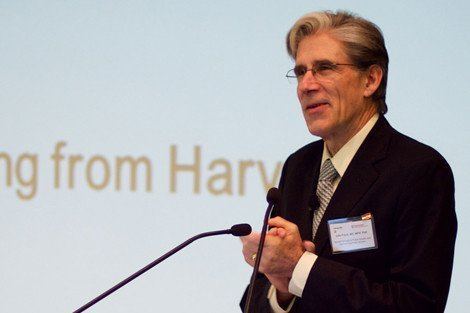November 8, 2013 —The rise of cardiovascular disease in two rapidly growing countries—Mexico and Brazil—was the focus of a symposium organized by Swiss Re and Harvard School of Public Health (HSPH) on October 15-16, 2013 at the American Academy of Arts and Sciences in Cambridge, MA. Both institutions commemorated landmark birthdays at the event, as 2013 marks the 150th anniversary of Swiss Re and the 100th anniversary of HSPH.
Public health experts, academics, and insurers were among those who attended the symposium, titled “The Impact of Cardiovascular Risk Factors on Healthy Lifespan and Mortality in Brazil and Mexico.” Nearly a dozen HSPH faculty members were among the more than 20 speakers who discussed topics related to the global rise in noncommunicable diseases, such as cardiovascular disease, now the leading cause of death worldwide. Among the other topics were smoking, the role of diet and physical activity, and indoor and outdoor air pollution.
In his welcoming address, HSPH Dean Julio Frenk said, “The essence of public health is to understand the relationship between risk factors and health outcomes and to then address the most significant of those risk factors, with the expectation that they will lead to improved health and prevent premature death.” Reinsurance companies such as Swiss Re, he noted, also aim to understand and manage risks.
The conference in Cambridge—along with a similar one focused on China and India on November 10-12, 2013 in Zurich, Switzerland—are part of a joint research collaboration between Swiss Re and HSPH entitled Systematic Explanatory Analyses of Risk Factors affecting Cardiovascular Health (SEARCH). At HSPH, the project is guided by [[Joseph Brain]], Cecil K. and Philip Drinker professor of environmental physiology; [[Douglas Dockery]], professor of environmental epidemiology and chair, Department of Environmental Health; and [[Michelle Williams]], Stephen B. Kay Family professor of public health and chair, Department of Epidemiology.
Through funding from Swiss Re, 11 postdoctoral fellows from Harvard have been awarded grants to continue their research on links between specific cardiovascular disease risk factors and mortality and longevity in rapidly developing countries. The project currently focuses on Brazil, China, India, and Mexico. Collaborators from the World Health Organization and institutions such as the Public Health Foundation of India also are affiliated with the project.
-

(L-R) Felix Moesner, consul, director, Swissnex Boston, and HSPH’s Joseph Brain chat with HSPH’s Frank Hu at the conference
“The Harvard collaboration offers the opportunity to hold more intense dialogue around risk factors in key countries around the world that hold the answer to not only longer lives, but longer, healthier lives,” said Eric Smith, CEO of Swiss Re America.
Check out the conference website for more information, including presentations from the speakers.
View details about the collaboration’s upcoming conference on cardiovascular health in China and India, set for November 10-12, 2013 in Zurich, Switzerland.
